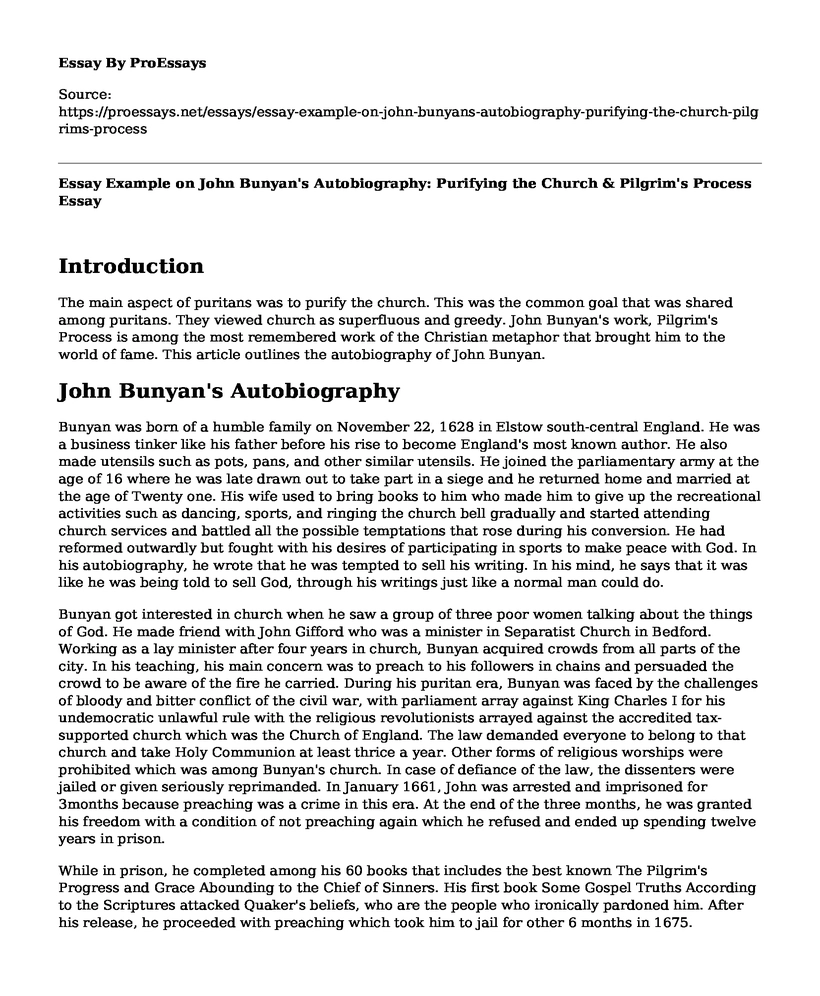Introduction
The main aspect of puritans was to purify the church. This was the common goal that was shared among puritans. They viewed church as superfluous and greedy. John Bunyan's work, Pilgrim's Process is among the most remembered work of the Christian metaphor that brought him to the world of fame. This article outlines the autobiography of John Bunyan.
John Bunyan's Autobiography
Bunyan was born of a humble family on November 22, 1628 in Elstow south-central England. He was a business tinker like his father before his rise to become England's most known author. He also made utensils such as pots, pans, and other similar utensils. He joined the parliamentary army at the age of 16 where he was late drawn out to take part in a siege and he returned home and married at the age of Twenty one. His wife used to bring books to him who made him to give up the recreational activities such as dancing, sports, and ringing the church bell gradually and started attending church services and battled all the possible temptations that rose during his conversion. He had reformed outwardly but fought with his desires of participating in sports to make peace with God. In his autobiography, he wrote that he was tempted to sell his writing. In his mind, he says that it was like he was being told to sell God, through his writings just like a normal man could do.
Bunyan got interested in church when he saw a group of three poor women talking about the things of God. He made friend with John Gifford who was a minister in Separatist Church in Bedford. Working as a lay minister after four years in church, Bunyan acquired crowds from all parts of the city. In his teaching, his main concern was to preach to his followers in chains and persuaded the crowd to be aware of the fire he carried. During his puritan era, Bunyan was faced by the challenges of bloody and bitter conflict of the civil war, with parliament array against King Charles I for his undemocratic unlawful rule with the religious revolutionists arrayed against the accredited tax-supported church which was the Church of England. The law demanded everyone to belong to that church and take Holy Communion at least thrice a year. Other forms of religious worships were prohibited which was among Bunyan's church. In case of defiance of the law, the dissenters were jailed or given seriously reprimanded. In January 1661, John was arrested and imprisoned for 3months because preaching was a crime in this era. At the end of the three months, he was granted his freedom with a condition of not preaching again which he refused and ended up spending twelve years in prison.
While in prison, he completed among his 60 books that includes the best known The Pilgrim's Progress and Grace Abounding to the Chief of Sinners. His first book Some Gospel Truths According to the Scriptures attacked Quaker's beliefs, who are the people who ironically pardoned him. After his release, he proceeded with preaching which took him to jail for other 6 months in 1675. However, he remained free until he died at the age of 60. The Pilgrim's Progress contained images of a pilgrim carrying a heavy load on his back. This load was an indication of his sins which he dropped when he came to the cross. It had a picture of a dangerous journey from the city of destruction to the holy city.
Conclusion
Bunyan's publication The Pilgrims Progress indicates the heavy load of sins carried by the generation of today. Many people are experiencing the difficulty of letting go of earthly enjoyments. The challenges he faced during his spiritual journey creates an impact among the present day Christians as they show the difficulties experienced in the journey of seeking the kingdom of God. Although there is the freedom of worship, current religious people are facing hardships of devoting to religion due to the demands brought by life. Therefore, Bunyan's biography is a motivation to me as it enhances my spiritual trust in God no matter how hard situations might be.
Bibliography
Bunyan, John, and Izaak Walton. Pilgrim's progress. Vol. 15. PF Collier & son, 2009.
Caroline c. Hodge. Boghani, Ami ed. "Pilgrim's Progress the Religion of John Bunyan and the Puritans". Gradesaver, 19 February 2013. Retrieved from: https://www.gradesaver.com/pilgrims-progress/study-guide/the-religion-of-john-bunyan-and-the-puritans
Johnson, Galen K., and Tabatha Raiees-Dana. "Recent Works on Bunyan: John Bunyan Bibliography, 1988-2008." Bunyan Studies 13 (2008): 115. Retrieved from: https://search.proquest.com/openview/e159f0b186469ff26e56610616c24cee/1?pq-origsite=gscholar&cbl=75972
Cite this page
Essay Example on John Bunyan's Autobiography: Purifying the Church & Pilgrim's Process. (2023, Jan 02). Retrieved from https://proessays.net/essays/essay-example-on-john-bunyans-autobiography-purifying-the-church-pilgrims-process
If you are the original author of this essay and no longer wish to have it published on the ProEssays website, please click below to request its removal:
- Jazz Literature: The Case of "Sonny's Blues" by James Baldwin
- Tessie Hutchinson in The Lottery Essay
- Princess Project Paper Example
- Analyzing Caliban as a Tragic Hero in Shakespeare's The Tempest
- Poetry Analysis Essay on "Mexican is Not a Noun"
- Uncovering the True Author of Shakespeare's Works - Essay Sample
- Essay Example on Macbeth: Too Much Ambition Leads to a Great Fall







